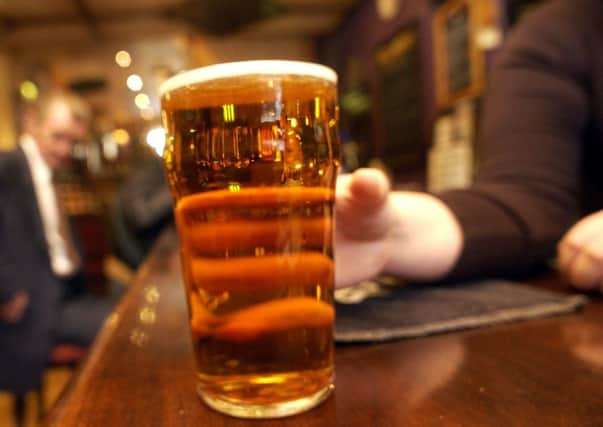Big rise in over-50s alcoholics ‘tip of iceberg’


Addaction, one of the UK’s leading charities dealing with addiction problems, saw 6,289 of over-50s being referred for alcoholism in 2013, up from 1,513 in 2009.
The figures have been described as “the tip of the iceberg” and the charity believes they reflect a problem across the UK.
Advertisement
Hide AdAdvertisement
Hide AdAddaction Scotland director Andrew Horne said many older people are turning to alcohol to deal with loneliness and isolation.
The results showed a rise of 125 per cent in referrals across all age groups – from 12,055 in 2009 to 27,168 in 2013 for alcohol and drugs.
The largest group in danger of alcohol problems is still the under 31 to 45 age group, according to the figures. People in this age group accounted for 41 per cent of all referrals in 2013.
The biggest increase has been in the over-50s,
Mr Horne said: “We are very concerned about the amount our older generations are drinking. We believe that these staggering figures are the tip of the iceberg. Addaction has worked hard to reach out to many of these older people who, historically, have been missed by traditional service delivery or were unwilling to engage with help.”
He added: “In the next 15 years we can expect to see 50 per cent more older people than at the turn of the century. And the number of men and women drinking more than the recommended weekly units of alcohol is also rising.”
Those with an alcohol addiction usually buy bottles of wine and drink them at home, according to the charity.
The Scottish Goverment’s plan to introduce a minimum price for alcohol is currently being considered by the European Court of Justice.
Efforts to bring in a minimum price were initially blocked by the other parties when the SNP Scottish Government first proposed them but were passed in 2012 with a minimum unit rate of 50p.
Advertisement
Hide AdAdvertisement
Hide AdThe UK government is considering bringing in the same measures for England and Wales, although the idea is opposed by many Tory MPs.
A Scottish Government spokesman said: “Alcohol misuse is not a marginal problem, restricted to one particular sector of society. Drinking too much is common across different ages, genders and socio- economic groups.
“That is why we are taking strong action to help everyone to drink less, as well as targeting those most at risk.
“Given that alcohol has become around 60 per cent more affordable since the 1980s, we strongly believe that, as part of our concerted package of over 40 measures, minimum price per unit of alcohol will be an effective and efficient way to tackle alcohol misuse”.
Scottish Tory shadow health minister Jackson Carlaw said: “Scottish Conservatives have repeatedly sought to clarify the status of alcohol minimum unit pricing, for which the Scottish Government appears unable to secure European Commission support.
“Meanwhile, nearly two years have passed without parliament discussing the issue of Scotland’s relationship with alcohol again. It is time the Scottish Government took the issue seriously.” #
Case study: David drank 12 units a day
DAVID, a 50-year-old factory worker, referred himself to Addaction’s ABC service after discussing his alcohol use with his wife.
He drank approximately 12 units a day, the equivalent of a bottle of wine plus an extra glass.
Advertisement
Hide AdAdvertisement
Hide AdDavid felt his alcohol use was increasing and was affecting his mood which could be low at times, so he agreed to keep a drinks diary prior to his next session as well as recording how he felt.
The mood diary showed that his low mood coincided with his drinking days.
After discussions at the centre David decided to change his lifestyle to stop filling empty hours with drinking.
He decided to try swimming and on days when his wife was also off, he planned to arrange an outing with her to prevent him from being tempted to drink.
Three weeks later, David found that his health and mood had improved and he no longer drank alcohol on his days off during the week.